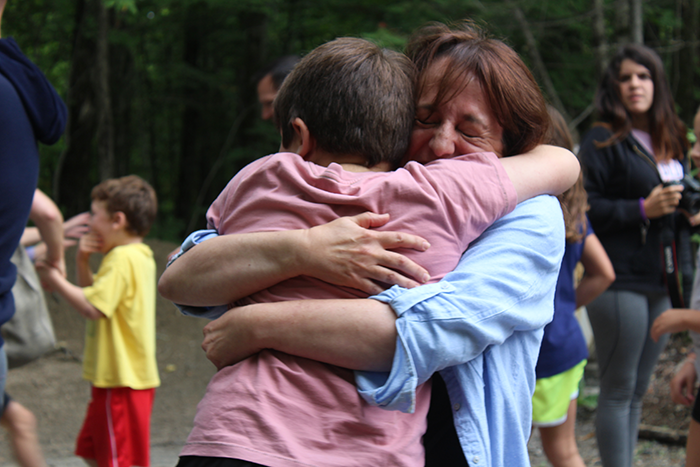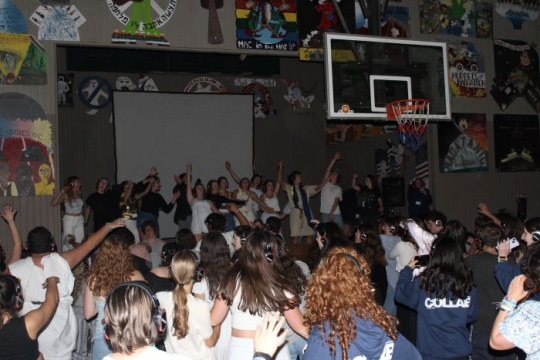
You've just picked up your child from camp. After the joyful hugs and the "I missed yous," you begin the drive home with your camper in the back seat and ask the big question: "So, how was camp?"
Camp is generally a great experience for kids. They deepen their Jewish identities, broaden their communities, and learn new life skills. However, these benefits can also mean your camper needs some time to process their experience on their own while readjusting to life at home.
I sat down with Cori Miller, the assistant director of camper care and enrollment at URJ's Camp Harlam in Kunkletown, PA, to discuss strategies for helping children settle back into life at home while nurturing the life skills they've developed at camp. Miller has a background in outpatient mental health and has worked at Camp Harlam since 2012. Here are some tips she shared for you and your camper as you settle back into your routines:
Judgement free is the way to be
It's important for all of us to feel seen, heard, and understood. When your camper returns home, fulfilling that need can often look less like dialogue and more like silence as you wait for your child to feel comfortable sharing their experiences. According to Miller, "Silence is sometimes your greatest asset. The less you talk, the more you're allowing your kids to talk and share with you." She reminds parents to "not place judgment on the things that your camper did or didn't do or on how they chose to navigate their experiences."
It's also perfectly normal, important, even, for campers to learn to make different decisions based on where they are (e.g., camp or home). Miller shares that, "children might make different choices outside of your supervision, and that's okay. What they do at camp and what they do at home can be different."
Remember: It's nothing personal
It can be difficult to not take it personally when your child doesn't overflow with joy and excitement when you ask to hear about their camp experience. After all, it may sting to not hear "I had a great time! Thanks for sending me here!" Many caregivers, especially those of first-time campers, might worry that they made a mistake in sending their kid to camp if they don't hear an enthusiastic reply.
However, Miller cautions against taking lackluster responses at face value: "Know that they're going to come home with a range of emotions and their own timeline for when they're ready to share their experiences. It's a transition and all kids do it on a different timeline. It's important for parents to not personalize when kids are ready to share or appreciate their experiences."
Hold space for "campsickness"
Parents often focus on helping their children make the transition to a camp mindset. However, helping ease your child back into a home mindset is just as important. During their time at camp, kids have so many memorable experiences and build so many lasting relationships that it becomes just as hard to leave camp as it might have been to leave home. It's hard to leave a place that holds friendships and exciting memories. Just as a camper might experience homesickness while away at camp, a child can experience "campsickness." When this hits, we often want to make our child feel better, but Miller recommends sitting with them, acknowledging their feelings, and giving them space to experience those feelings.
She explains that "it doesn't diminish how happy they are to return home, but until they adjust to the loss of that completely immersive experience and transition to being at home, [campers can experience] a sort of mourning period."
Look at the big picture
Many times, caregivers can hyperfocus on elements of an experience. Miller uses the metaphor of packing: "How do we really get ready and pack for camp? It's not just about the things your kids bring with them, it's about how you prepare them. I think that a similar experience is needed at the tail end when camp is over, you need to 'unpack.'"
While physically unpacking can be relatively easier than packing (just throw everything in the laundry and call it a day), Miller reminds caregivers that the emotional and social unpacking of children's experiences is often much slower.
She helps caregivers unpack when they call about a child who is suddenly apprehensive about returning the following year: "I often ask 'What were they like when you picked them up? What was the first day like? What was the first week like? How did you get snippets of their experience?'" Often, this timeline will help give the caregiver some insight into the full breadth of their camper's experience.
Connect camp and home
When children return home, they might immediately jump back into technology, but Miller cautions against discouraging this behavior: "Often, that's their lifeline back to camp and maintaining connections. Chances are, they're connecting with the camp people they just left."
Another useful way to keep connections strong while easing back into life at home is to let your campers bring a little bit of camp home with them. Whether asking your child to help make one of their favorite camp meals for Shabbat (check out our recipes) or talking about how they handled a tricky situation, you give your child the chance to reflect on their experiences and the life skills they learned. Miller explains that doing this can also help you and your child see what they learned is transferable to their life at home.
Your child may immediately come home gushing about their time at camp, or they might withdraw to process their experiences alone. Either way, by letting them lead the conversation, giving them a safe space to express their emotions, and listening without judgement, you're helping your child build on the skills they learned at camp to become independent, resilient, and confident.
Related Posts

Empathy in Action: Becoming a Teen Mental Health First Aider

The Promised Land is in You and Me

